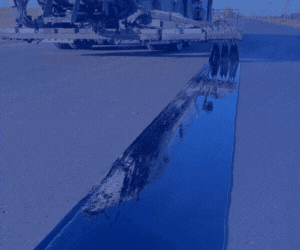 Dr. Mark Buncher, Ph.D., P.E. is Director of Engineering for the Asphalt Institute (AI). He recently marked his 20-year anniversary with AI.
Dr. Mark Buncher, Ph.D., P.E. is Director of Engineering for the Asphalt Institute (AI). He recently marked his 20-year anniversary with AI.
What drew you to engineering and transportation?
Engineering because I was stronger (relative term) in math and science than other subjects. I chose civil engineering because I had this vision of working outside on a big construction site (at age 18, suntans were important). How ironic…now my job rarely gets me out in the field, and when it does, my doctor says to wear a hat and sunscreen. At the end of my undergrad, I joined the United States Air Force as a Civil Engineering Officer. I developed a passion for pavements during my favorite assignment–Pavement Evaluation Team Chief. We traveled around the world conducting structural evaluations of airfields and remote airstrips. I learned enough about pavements to be dangerous, and to realize there was so much more I wanted to learn by specializing. During my Ph.D. program, one of my favorite professors liked to say “Pavements are for simple minded people.” This confirmed I made the right choice.
How do you and your team stress quality when it comes to paving?
Our team of eight regional engineers spread across the United States and Canada provide an array of activities supporting our industry. These include teaching best practices in our many training courses, helping agencies improve their specifications, serving on committees and resolving issues to move our industry forward. The litmus test for everything we do is that it needs to be rooted in providing quality asphalt pavements. As an industry, that’s the best way we can promote asphalt pavements…continually strive for outstanding performance and long life.
Why are airport pavements especially challenging?
First, heavier loads mean thicker pavements. Aircraft like the Airbus 380 can exceed a million pounds, relative to the legal limit for interstate highways and bridges of 160,000 pounds. A second reason is very high tire pressures. Military fighter aircraft have 300+ psi tires and commercial aircraft typically around 250 psi, relative to truck tires running up to 120 psi. Airfield surface mixes need to have extremely high stability to resist rutting from these high tire pressures. A third reason is Foreign Object Debris (FOD). Cracking or other pavement distresses generate FOD that can be ingested into jet engines, leading to very costly engine repairs and even worse–fatal engine failure during flight. So, it is critical that airfield mixes are durable and resist cracking. That’s why we say airfields are the “high wire act” of asphalt paving.
How does increasing in-place density affect pavement life?
Studies confirm that better compaction, or increased in-place density, extends pavement service life. A rough rule of thumb is that for every 1 percent improved compaction (1 percent decrease of in-place air voids), pavement life improves by at least 10 percent. Depending on specifics, that increase could be much greater. The reasons are simple. Increased in-place density means greater resistance to rutting and shoving, and less permeability for improved durability and resistance to fatigue cracking. AI partnered with FHWA to deliver one-day workshops in 28 states that focused on improving in-place density.
What are some focus areas for future asphalt research?
On the binder side, we need better durability and fatigue characterization that captures relaxation. On the mix side, we need to select the best cracking performance tests and criteria that correlate to actual cracking in the field. Field validation is often the most under-developed aspect of implementing these tests into a specification. An area that doesn’t directly fall under asphalt but would go a long way to improve our roads is to explore new procurement models, perhaps with reliable performance measures and extended warranties. I believe the low-bid system we rely on in the U.S. stifles innovation and ultimately quality. If rewarded to do so, contractors and material suppliers will develop new and improved technologies.













